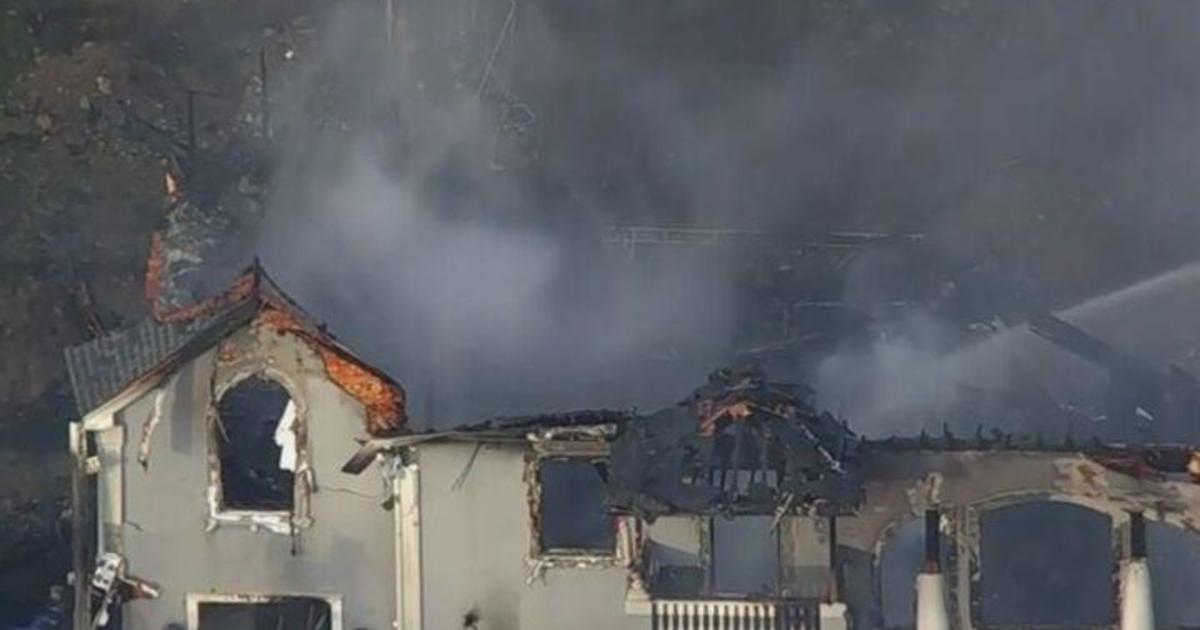Brown Tide In Great South Bay Puts Clams At Risk
STONY BROOK, N.Y. (CBSNewYork) -- The devastating brown tide has returned to the Great South Bay off Long Island, killing shellfish as the tourist season kicks off.
As CBS2's Jennifer McLogan reported, this is the third straight year that the brown tide has plagued the Great South Bay. But rarely has it been this dense, or appeared this far into the season.
The beautiful blue water is brown because of too much nitrogen, which caused algae blooms, WCBS 880's Sophia Hall reported.
Brown Tide In Great South Bay Puts Clams At Risk
The algae are what lead to what is called a brown tide, according to Stony Brook Professor Christopher Gobler.
He says the nitrogen gets into the water from cesspool pollution.
"The major sources of nitrogen are household septic tanks and cesspools" Gobler said. "These bays are very shallow, and so because they're shallow, the influence of nitrogen from land can be very large."
Marine scientist Kevin McAllister, of the group Defend H2O, said this is just the latest problem after recent die-offs of bunker fish and diamondback turtles on the East End.
"We've reached our tipping point in our bays relative to nitrogen pollution," McAllister told 1010 WINS' Mona Rivera.
Brown Tide In Great South Bay Puts Clams At Risk
Brown tide can harm young clams, which could stop growing and die.
"The timing is very unfortunate because this is the exact time when the adult hard clams will be spawning and releasing juvenile clams into the environment," Gobler said. "For example, last fall we were doing an experiment. Most of our hard clams we had out there were juveniles. They either died or just stopped growing."
McAllister told CBS2's McLogan that the crisis cannot be allowed to continue.
"Apathy is unacceptable," he said. "A dead bay is not OK."
As a fisherman, biologist, and former baykeeper, McAllister's eyes reflect dramatic changes he has seen over 30 years as the brown tide has decimated the shellfish population.
"Ultimately, we have to start rallying around these waters," McAllister said. "This lifeblood of Long Island - what defines us -- is our waters. We can't watch slip away decade by decade."
McAllister was among those tracking the die-off last week of thousands of bunker fish, or menhaden, in Peconic Bay. He also tracked turtle deaths last month in estuaries connecting the North and South Forks.
Students at Stony Brook University have also begun studying the death of eel grass and shellfish, suffocating in the brown tides of the Great South Bay.
"It looks almost as if you're churning up mud, but it is the color of the water – just turns beat red, brown, and it's disheartening to see," said Stony Brook research vessel captain Brian Gigliardi.
Led by Gobler, researchers have been measuring algae blooms in shallow, poorly-flushed, and nitrogen-rich areas. He said high concentrations cloud the water and deplete oxygen.
"This water gets so dark; so dense, you put your hand in it -- by time you get to your elbow, you can't see your fingers," Gobler said.
Gobler emphasized that the brown tide is not harmful to humans. And in terms of clam harvesting, one business operator said it was not a threat.
Bill Zeller, who owns Captree Clam Company, said so far the brown tide is not a threat.
"The effect on our supply chain is very minimal," Zeller said, adding clammers have other waterways to choose from. "For us in the supply business of clams and oysters, right now it's not keeping me awake at night."
But there are more worries than that, and the problem is serious, Gobler said. The shellfish that are being poisoned by the brown tide are essential to the health of the bay – acting as water filters.
Some have lobbied legislators to take action.
Water temperature at around 75 degrees typically kills brown tide. But since it has been a cooler June, the brown tide could persist well into the summer.
Once the brown tide subsides, scientists and students hope to reseed juvenile clams in threatened bays.



